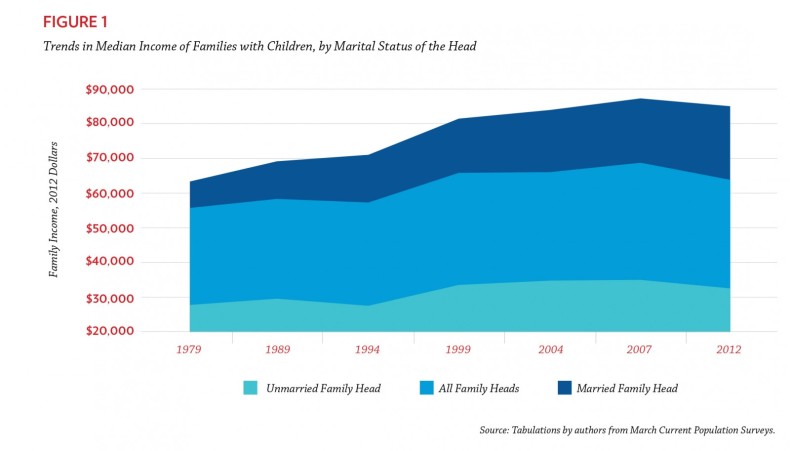The American Enterprise Institute’s (AEI) recent report lends more weight to the argument that marriage is good for your pocket. It argues that “changes in family formation and stability are central to the changing economic landscape of American families, to the declining economic status of men, and to worries about the health of the American dream.”
The report contains 5 key findings (abbreviated):
-
The retreat from marriage [is] a retreat that has been concentrated among lower-income Americans;
-
Growing up with both parents (in an intact family) is strongly associated with more education, work, and income among today’s young men and women;
-
Men obtain a substantial “marriage premium”…, and both men and women enjoy substantially higher family incomes, compared to peers with otherwise similar characteristics;
-
Growing up with both parents increases your odds of becoming highly educated, which in turn leads to higher odds of being married as an adult. Both the added education and marriage result in higher income levels.
-
The advantages of growing up in an intact family and being married extend across the population. They apply about as much to blacks and Hispanics as they do to whites.
The AEI “estimate that the growth in median income of families with children would be 44 percent higher if the United States enjoyed 1980 levels of married parenthood today.” But is this not magic-wand stuff? Not really, once you understand what wealth creation is – merely the manifestation of the right political structure coupled with the right familial structure. It can create Detroit 1964 or it can create Detroit 2014 – the former one of America’s wealthiest cities; the latter one of her poorest. Decades of political mismanagement has had one consequence greater than all the others put together: it destroyed the urban Black family.
Misguided welfare policies, in all countries, have made fathers an economic impediment. Increasingly women from “deprived” areas have been making financially logical choices (in the short term) not to get married. Given circumstance, can I blame them? They have, after all, been disgracefully let down by their leaders, academics and intellectuals.
Here are a few ideas at a more granular level as to why marriage works:
– that seeing a Dad go out to work – perhaps even a job he hates – is good for your development;
– that seeing how money is earned is better for a child’s development than money that’s merely gotten;
– that seeing a Dad as a principal provider is not only unlikely to turn you into a vicious little misogynist bully, but give you a strong sense of duty and responsibility;
– that income is not absolutely determinant, but how it comes into the house, and from whom (you can control for income with generous welfare payments to single parents and they still do worse…)
These are behavioural and moral modelling factors in a child’s life that no legion of social workers, psychologists, community health workers and community liaison outreach diversity inclusion officers (I made that one up…Ihope…) can replace. And the cost to the state? Zilch.
This leads me to some logical conclusions. While I’m not a fan of social engineering, we live in a world where legislatures write laws to mould society in their image – so I might as well volunteer some ideas. Apropos of Ben Conroy’s recent piece on family-friendly tax policies, imagine a world where legislators actually enacted laws that really did help society. Given that the premise for a lot of recent legislation seems to be “what benefits Revenue” – banning/severely restricting fizzy drinks, salt shakers in chippers etc. – how about the courage, decency and integrity to mould society with laws and tax policy to unapologetically incentivise (i) getting married, and (ii) staying married?
There would be some losers, alas: imagine the job losses among prison guards, social workers, child psychologists, Gardaí, welfare officers, public housing officials…………
















